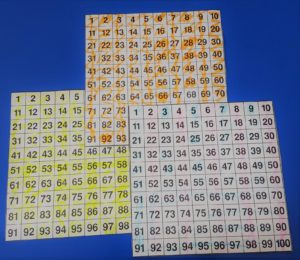We like to play this easy maths game because it can be adapted for almost all abilities. This game uses the hundred square and it really helps children explore numbers. You can also use it to expand your child’s mathematical vocabulary.
The Hundred Square Game
This easy maths game is based on the fun party game Who Am I?. You are going to allocate a number to each child and they are going to ask questions until they identify it. The winner is the person who correctly guesses their number before everyone else. The real beauty of this game is the way in which children will use mathematical vocabulary and explore new concepts.
Hundred Square Game Instructions
You will need:
-
Some hundred squares – one per player. You can use this hundred square or you might want to use this one, which is editable, as it’s in Open Office format.
You might even want to give the children a blank template, which they can write the numbers onto, if they need the practice.
-
Post-its or scraps of paper with masking tape. You are going to write numbers on these and stick them to the players’ foreheads. Alternatively, it’s fun to draw the numbers on with face painting crayons.
Method:
1. Allocate a number to each player. The players should not know their numbers. If you have very little children, give them a low number. Stick or write the numbers on their forehead. You should join in too, so that you can model questions for them.
2. Each player asks closed (yes/ no) questions about their number (e.g. ‘Is it an even number?’ – see below for a list of suggested questions). They cross off numbers as they are eliminated. For example, if they know their number is less than 50, they can cross off the bottom half of the hundred square. They can carry on asking questions until they get a ‘no’ answer. Then it is the turn of the next player.
3. The winner is the player who correctly guesses their number first.
Variations
You could play this game with shapes instead of numbers.
Suggested Question Types
The children will follow your lead, so it’s important to ask questions that will encourage them to explore mathematical patterns and vocabulary. This will help them go beyond simple mathematical education and help them develop different approaches to maths.
1. Am I more than 50 (or other number)?
2. Am I less than 50 (or other number)?
3. Am I an even number?
4. Am I an odd number?
5. Am I a multiple of 3 (or 4, 5, 6, 7, 8, 9, 10, 11, 12)?
6. Am I a prime number?
7. Am I a composite number?
8. Do I have a ‘3’ (or other number) in my tens column?
9. Do I have a ‘5’ (or other number) in my units or ones column?
10. Am I a square number?
There are plenty more questions you could ask and you will be amazed at the connections your children will make between numbers and the patterns they will spot.
If you enjoyed playing the hundred square game, try another easy maths game the whole family will love.


